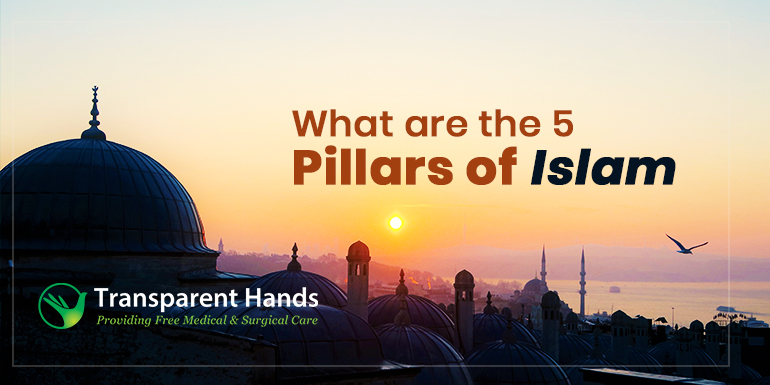The 5 Pillars of Islam: Purpose and Importance

The 5 pillars of Islam are essential for Muslims to practice in their daily lives. A Muslim’s faith is summed up into 5 simple rules called the pillars of Islam. They are, Shahāda, Salāh, Zakat, Fasting, Hajj.
These 5 pillars of Islam provide Muslims with a framework to spend their lives by binding them into religious obligations. Each Muslim must put his faith in these basic norms.
The Purpose and Importance of 5 Pillars of Islam
The 5 Pillars of Islam
1. Shahāda
2. Salāh
3. Zakat
4. Fasting
5. Hajj
Lets get to know in details what are these 5 pillars of Islam.
1. Shahāda
Shahāda requires a person to know something well, declare and testify. Every Muslim must give Shahāda at the very first step that is the declaration of his faith in Islam. Shahāda means to accept that there is no god except Allah, and Hazrat Muhammed (S.A.W.W) is the last Prophet of Allah. A person who pronounces this phrase with conviction becomes a Muslim by heart.
Islam invites everyone to liberation from all sorts of slavery to get united for the Almighty Allah. Saying Shahāda loudly binds all the Muslims into one Ummah. Those who give Shahāda from their hearts and have a firm belief in it are promised to enter Jannah in the life hereafter.
2. Salāh (Prayer)
Salāh is regular prayer, 5 times a day. Muslims worship the Almighty Allah by offering their prayers. It is one of the most important in the 5 pillars of Islam. Prayer is not just a physical movement but a complete process that involves all three: the mind, the soul and the body. If anyone of these is missing, the goal of meditation will not be achieved. According to the Holy Quran, Salāh saves people from distress and fears and helps them refrain from all evils. Performing regular prayers does not only remind a Muslim of his belief but also strengthens his relationship with Allah. Therefore, Salalāh is compulsory for every adult Muslim and parent is supposed to urge their children to pray when they reach the age of seven.
3. Zakat
Zakāh is derived from the Arabic word “Tazkiyah” which means “purification”. According to Islam, it is not a charity but a religious rite for the poor, weak, old and infant in a way prescribed by Allah himself. It is the donation of a portion (2.5 %) of one’s wealth every year. It is a religious obligation to all individuals and institutions and a respectable way to help the needy.
The system of zakāh proves that Islam is not just concerned about a man’s relation with Allah but it also advises and guides him in his relation to other human beings. Zakāh is of two types: one is to provide food or money to serve those in need. The other form is to refrain from indecent actions and idle talk called fasting.
4. Fasting (Sawn)
Muslims are obligated to fast during the month of Ramadān. Fasting is a way to gain self-control and discipline. A Muslim postpones the gratification of his daily needs and desires in compliance with the order of Allah Almighty. Fasting instills flexibility and adaptability of habits in a person by restricting him within the boundaries prescribed by the Almighty for the whole month of Ramadān. It develops empathy in a man to feel for the poor, who experience hunger on a daily basis. A person feels compassion for the poor and tries to help them actively. According to research, almost 25 % of the total population of the world do not have enough food to eat. This population can easily be fed for two to three months if just a one-time meal is saved for a month. Therefore, zakāh and fasting put a huge contribution to global humanitarian relief.
5. Hajj
Hajj is the fifth pillar of Islam. It is the world’s biggest annual religious gathering that stands out due to the immense magnitude of pilgrims. Hajj is obligatory to a person whose financial, physical, and familial conditions permit it. Hajj is a complete series of certain individual and collective actions at different times and places in Mecca and Madina in a pattern set by Hazrat Mohammad (S.A.W.W). Almost two million Muslims come to Mecca and Madina once a year to perform this religious duty and strengthen their belief and honor Hazrat Muhammed (S.A.W.W). They spend time performing Hajj, ignoring worldly luxuries and other distractions.
The Importance of Hajj is Islam
Islam has been founded on these 5 pillars namely, Shahāda, Salah, Zakat, Fasting, and Hajj. Hazrat Muhammed (S.A.W.W) has provided his Ummah with this action-based program from Allah in order to strengthen our love with Allah. Now it is compulsory for all Muslims to uphold these basic norms and put them into practice.










Amazing…. Precise and well written!